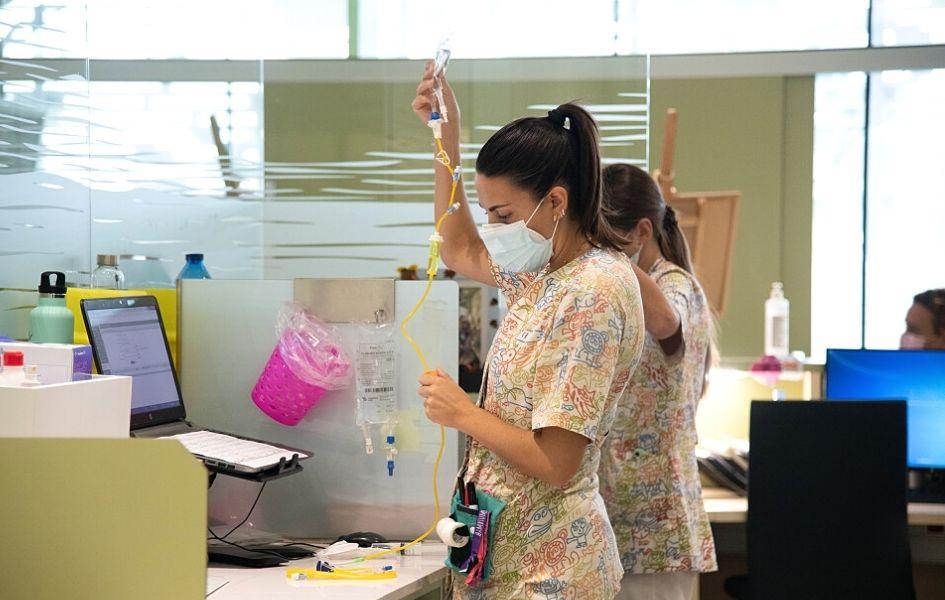The Oncology Unit at SJD Barcelona Children's Hospital stabilises a high-grade glioma thanks to targeted therapies

The joint work of the healthcare and research team, together with a precise diagnosis from the molecular biology laboratory and the surgical team's work made it possible to treat a patient who had run out of options in his home country.
The patient, aged two, from Saint Petersburg, arrived in March 2020 to be treated in the Oncology Unit of SJD Barcelona Children's Hospital. He had been diagnosed with paediatric hemispheric high-grade glioma: a very rare brain tumour that generally occurs in the first year of life. In general, the prognosis of these patients is not good, these tumours are difficult to operate on and their response to standard treatment is not good. This toddler had already undergone several operations and had been treated with chemotherapy to no avail in his home country and had therefore run out of treatment options.
The child's family contacted SJD Barcelona Children's Hospital's International Patient Care Department and sent a tumour sample from Russia so that the molecular biology team could study it in order to obtain an accurate diagnosis and the possibility of identifying the molecular alteration that would make them a candidate for targeted treatment.
The study detected a molecular alteration recently described during a collaborative project in which the SJD Barcelona Children’s Hospital participated, indicating that specific molecular alterations are involved in the formation of some high-grade gliomas in young children. One of them, involving the ALK gene (a frequent alteration in lung cancer) was identified in the child's tumour.
Targeted molecular therapy: an option to be explored for high-grade glioma in infants
The oncologist who treated the child and the Healthcare Director of the Oncology Area, Andrés Morales La Madrid, explained: “After identifying this alteration, our team began to seek drugs to treat it specifically. We needed a drug for the targeted treatment of this ALK modification and also which would particularly reach the brain properly, which is a part of the body where it is more difficult for drugs to act. The so-called blood-brain barrier acts as an obstacle to harmful substances (including drugs), which is positive from the evolutional standpoint, but negative in terms of getting treatments to actually reach the brain”, Morales explained. “Then, the possibility of using a drug called Alectinib arose. This drug is used in adults to treat certain types of lung cancer that have this alteration and since there are more patients affected, the pharmaceutical manufacturers have developed targeted drugs”, said the centre's Oncology Director.
With the help of Roche, the company that makes the drug, they calculated the right dose to adapt it to a two-year-old child: pharmacokinetic studies had to be conducted because this was the first time ever that the drug was being used on a paediatric patient, and tolerance and toxicity had to be checked in order to ensure that they were acceptable. Once the right dose had been calculated, treatment on the child began, and a few weeks later a magnetic resonance showed that the large-sized tumour (which several operations in the child's home country had failed to remove) had diminished very substantially between March and June 2020 and had all but disappeared.
Drug resistance, an event that is also possible in targeted therapies
The child was treated with the same drug over several months, although in September that year the treating team detected that the glioma had developed resistance to the drug, which can occur with targeted therapies. The tumour had grown, and further surgery was required, this time in Barcelona. The Head of the Neurosurgery Service, José Hinojosa, operated on the child successfully and removed the entire tumour, which was sent for a new analysis. In this case, the molecular oncology laboratory identified a second alteration in the same ALK gene. Although the entire tumour had been removed, it had begun to grow in the same area again. For this reason, the team proposed that a second drug be used, in this case Lorlatinib, which is indicated in cases treated with Alectinib in which the disease has progressed. On this occasion, and with the help of Pfizer, the child initiated treatment, once again with an excellent response, and the situation is expected to remain stable for as long as possible.
“This child was treated successfully thanks to teamwork, involving the molecular biology laboratory, the surgical and clinical team of the Neurooncology Unit, the oncological pharmacy and the involvement of two pharmaceutical manufacturers”, highlights Morales La Madrid. “Highly complex cases, such as this child, whom we expect to evolve positively, illustrate the importance of our precision oncology programme, which allows us to explore treatments for children who would not have them in other countries. Very few centres do this in paediatric oncology. Moreover, our molecular biology laboratory team, do not only analyse the tumour, but they also interpret the data appropriately, since not all the alterations that are found in tumours are always relevant to tumour growth and progression. If we know which ones to inhibit, we will have a better chance of saving lives”, Morales concludes.



